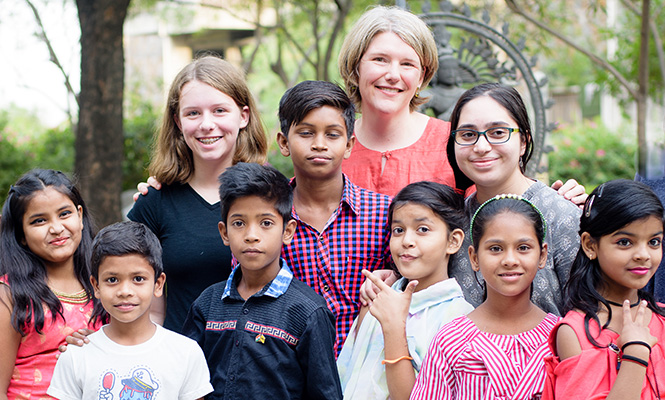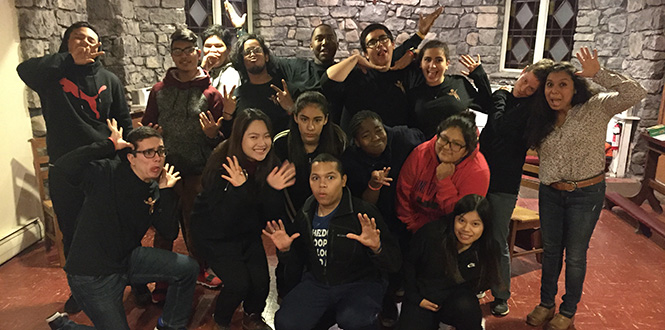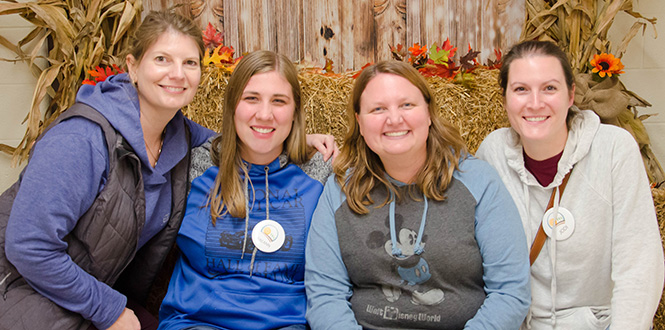Schwab award recipients transforming lives through community projects
July 1, 2019 — A trio of Grinnell College alumni are paying tribute to a community-minded classmate while carrying out projects in India, New York, and Michigan that will educate and inspire.
Shayne Beschta ’95, Heather May ’92, and Carrie Fetzner Ramirez ’97 are the 2019 recipients of the Lori Ann Schwab ’95 Alumni Grants.
Schwab was committed to making the world a better place by helping others. Her life was cut short by a sudden illness while she was studying in London in 1994.
The grant provides stipends to support specific community service projects that recipients are significantly involved with. It is open to alumni from the classes of 1992 through 1998, the years that overlapped with Schwab’s time at Grinnell.
Beschta received a $1,000 stipend to rehabilitate a small library that serves a community of more than 3,600 underprivileged children in one of the world’s most crowded cities.
When she arrived in New Delhi, India, Beschta was shocked to discover a slum community, Viiveknand, located less than two blocks from her comfortable home.
 Shayne Beschta ’95, top, poses with some children from the Viiveknand community in New Delhi, India. Beschta’s project will rehabilitate a neighborhood library.
Shayne Beschta ’95, top, poses with some children from the Viiveknand community in New Delhi, India. Beschta’s project will rehabilitate a neighborhood library.
The Viiveknand community library has just 200 donated books, most of which were are outdated. Half of the books are no longer lent out due to missing pages or bindings. Despite the meager selection, children line up outside the library every Sunday eagerly awaiting a volunteer librarian to open the doors.
For the past two years, Beschta has taught English to students from Viiveknand through a program called Make A Difference, and week after week she watches the students tackle extra hours of classes with skill, enthusiasm, and pride.
“They are everyday evidence of the power of education to change mindsets and lives,” Beschta says. “During this time, I’ve come to know the camp as a vibrant, diverse, and resourceful community.”
The goal of this project is to bring ongoing educational and enrichment opportunities by making the scarce resource of books available. The grant money is being used to purchase books in Hindi and English, as well as purchase two benches and a table.”
“With a strong record of supporting education, strong ties to both adult and student volunteers from the MAD program, and strong internal and external support, I am extremely optimistic about the library’s success,” Beschta says.
In contrast to urban overcrowding, May’s project serves rural adolescents. May, an associate professor at Hobart and William Smith Colleges and artistic director of Mosaic NY, a social justice theatre company, received a $1,500 stipend for the Justice Organization of Youth (JOY). JOY is made up of teenagers who are looking to make a positive change in their communities. The students write and create theatre pieces that reflects their lived experiences as the children of farmworkers families in rural New York.
 Teens involved in the Justice Organization of Youth display their theatrical side.
Teens involved in the Justice Organization of Youth display their theatrical side.
“One of the things that was most exciting to me about JOY was that the impetus for the work comes from the students themselves,” May says. “The students were concerned with a number of pressing issues in their community and they recognized that they could use the platform of theatre to build awareness and engagement in these issues.” The grant money will be used to purchase T-shirts and the design of a logo for the company as well as the costs associated with traveling to performances or educational conferences.
“I have been tremendously fortunate to collaborate with this group of creative, insightful, and imaginative students for the past three years and am excited to tell them that they will now be able to have a logo and T-shirts designed for their company,” she says. “For students who are often marginalized by their peers and their school systems, this form of validation is phenomenally important as it sends the message that their words are worth claiming and celebrating. I am so grateful to be able to use this Lori Ann Schwab grant to remind these students that they are making real change in the world.”
Another rural community initiative is being bolstered by Ramirez, who received a $1,000 stipend to purchase tables and chairs for programing at the East Olive Community Center in St. Johns, Michigan. Ramirez, an environmental, health, and safety auditor at General Motors, helped start the center in 2018 to provide educational and recreational events and programming as well as services that improve the health and well-being of local residents.
The project took on greater importance recently when the local community health center was forced to discontinue social, recreational, and fitness programming for disabled youth and adults.
 Carrie Fetzner Ramirez ’97, second from right, sits for a group photo with other board members of the East Olive Community Center.
Carrie Fetzner Ramirez ’97, second from right, sits for a group photo with other board members of the East Olive Community Center.
“Like many rural communities, this area lacks ready access to services and educational programs that larger communities have,” Ramirez says.
Ramirez and her fellow volunteers obtained supplies, created program spaces, and identified people to run the programs. Having tables and chairs was the missing element.
“Beyond this specific project, the tables and chairs we purchase will allow us to be more accessible to community members,” she says. “We can now confidently consider programming for participants with limited mobility including our disabled residents and senior citizens. We are excited to provide programs that improve and promote the quality of life of residents in the St. Johns area and are very humbled to be included as one of this year’s grant recipients.”
— by Jeremy Shapiro